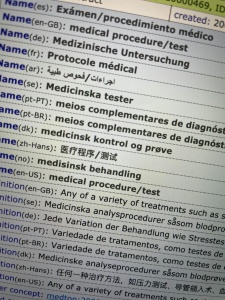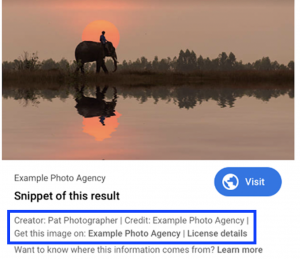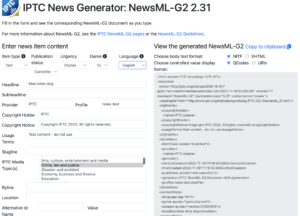Categories
Archives

The IPTC has updated its Photo Metadata User Guide to include some best practice guidelines for how to use embedded metadata to signal “synthetic media” content that was created by generative AI systems.
After our work in 2022 and the draft vocabulary to support synthetic media, the IPTC NewsCodes Working Group, Video Metadata Working Group and Photo Metadata Working Group worked together with several experts and organisations to come up with a definitive list of “digital source types” that includes various types of machine-generated content, or hybrid human and machine-generated media.
Since publishing the vocabulary, the work has been picked up by the Coalition for Content Provenance and Authenticity (C2PA) via the use of digitalSourceType in Actions and in the IPTC Photo and Video Metadata assertion. But the primary use case is for adding metadata to image and video files
Here is a direct link to the new section on Guidance for using Digital Source Type, including examples for how the various terms can be used to describe media created in different formats – audio, video, images and even text.
IPTC recommends that software creating images using trained AI algorithms uses the “Digital Source Type” value of “trainedAlgorithmicMedia” is added to the XMP data packet in generated image and video files. Alternatively, it may be included in a C2PA manifest as described in the IPTC assertion documentation in the C2PA specification.
The official URL for the full vocabulary is http://cv.iptc.org/newscodes/digitalsourcetype, so the complete URI for the recommended Trained Algorithmic Media term is http://cv.iptc.org/newscodes/digitalsourcetype/trainedAlgorithmicMedia.
Other terms in the vocabulary include:
- Composite with synthetic elements – https://cv.iptc.org/newscodes/digitalsourcetype/compositeSynthetic – covering a composite image that contains some synthetic and some elements captured with a camera;
- Digital Art – https://cv.iptc.org/newscodes/digitalsourcetype/digitalArt – covering art created by a human using digital tools such as a mouse or digital pencil, or computer-generated imagery (CGI) video
- Virtual recording – https://cv.iptc.org/newscodes/digitalsourcetype/virtualRecording – a recording of a virtual event which may or may not contain synthetic elements, such as a Fortnite game or a Zoom meeting
- and several other options – see the full list with examples in the IPTC Photo Metadata User Guide.
Of course, the original digital source type values covering photographs taken on a digital camera or phone (digitalCapture), scan from negative (negativeFilm), and images digitised from print (print) are also valid and may continue to be used. We have, however, retired the generic term “softwareImage” which is now deemed to be too generic. We recommend using one of the newer terms in its place.
If you are considering implementing this guidance in AI image generation software, we would love to hear about it so we can offer advice and tell others. Please contact us using the IPTC contact form.
 Today, IPTC announces the biggest change to the NewsCodes vocabularies in years. Almost 200 terms have been modified in the Media Topics vocabulary, including many “retirements”, trimming the CV down to exactly 1100 terms.
Today, IPTC announces the biggest change to the NewsCodes vocabularies in years. Almost 200 terms have been modified in the Media Topics vocabulary, including many “retirements”, trimming the CV down to exactly 1100 terms.
Overall, three controlled vocabularies have been updated: Content Warning, Content Production Party Role and Media Topic.
The changes to Media Topic CV are the biggest ever, with 9 new concepts, 60 retired concepts and 120 modified concepts, including 79 hierarchy moves.
The NewsCodes Working Group has been working hard on this update for over six months, bringing much-needed clarity to the “economy, business and finance” branch.
As part of the review, the “economic sector” sub-branch has been re-named “products and services”, handle both the companies making products or providing services, and also the products and services themselves.
Specifically, we have changed the following:
- 9 New concepts: business reporting and performance, business restructuring, commercial real estate, residential real estate, podcast, financial service, business service, news industry and diversity, equity and inclusion.
- 60 retired concepts: business finance, accounting and audit, analysts comment, earnings forecast, stock option, licensing agreement, aquaculture, arable farming, livestock farming, viniculture, fertiliser, health and beauty product, inorganic chemical, organic chemical, computer networking, computer security, telecommunication equipment, design and engineering, house building, land price, real estate, beverage, grocery, mail order, non-durable good, kerosene/paraffin, financial and business service, funeral parlour and crematorium, janitorial service, personal finance, personal income, personal service, printing service, wedding service, industrial component, instrument engineering, news agency, newspaper and magazine, online media industry, iron and steel, mining, non-ferrous metal, process industry, distiller and brewer, paper and packaging product, rubber product, soft drinks, textile and clothing, traffic, securities, renewable energy, stock recommendation, buy recommendation, hold recommendation, sell recommendation, hot stock, Internet of Things, capital goods, e-cigarette and commercial building. Most of these have notes attached describing which terms should be used instead of the retired ones.
- 39 name (label) changes: terrorist bombings, stock buyback corporate dividends corporate earnings, business financing, shareholder activity, executive officer, business strategy and marketing, products and services, commercial fishing, plastic, computer and telecommunications hardware, semiconductor and electronic component, software and applications, restoration, online shopping, toy and game, renewable energy, electricity, waste management, auction, consultancy, financial advisory service, personal finance and investment, shipping and postal service, media and entertainment industry, books and publishing, film industry, metal and mineral mining and refining, precious material, beverage and grocery, tobacco and nicotine, casinos and gambling, derivatives, stocks and securities, handicrafts, oil and gas, sales channel and heating and cooling.
- 81 definition changes: cyber crime, war crime, bankruptcy, stock buyback, corporate dividends, corporate earnings, business financing, shareholder activity, stock option, business governance, new product or service, patent, copyright and trademark, products and services, agriculture, commercial fishing, forestry and timber, pharmaceutical, plastic, computing and information technology, computer and telecommunications hardware, semiconductor and electronic component, software and applications, telecommunication service, wireless technology, restoration, clothing, online shopping, luxury good, retail, toy and game, energy and resource, renewable energy, diesel fuel, electricity, natural gas, waste management, water supply, accountancy and auditing, auction, banking, market research, personal finance and investment, rental service, shipping and postal service, defence equipment, heavy engineering, machine manufacturing, shipbuilding, media and entertainment industry, advertising, books and publishing, film industry, music industry, public relations, radio industry, television industry, metal and mineral mining and refining, building material, precious material, beverage and grocery, tobacco and nicotine, tourism and leisure industry, casinos and gambling, hotel and accommodation, restaurant and catering, tour operator, transport, air transport, railway transport, road transport, derivatives, stocks and securities, handicrafts, asset management, railway manufacturing, medical equipment, pet product and service, biofuel, utilities, streaming service and crowdfunding.
Currently, the name and description changes have only been made in English (both en-GB and en-US variants). Other language versions will come soon when their maintainers can make the appropriate changes to their translations.
Changes to Content Warning CV
New terms Drug Use, Fantasy Violence, Flashing Lights, Personally Identifiable Information to match standard terms used in the industry. The “Flashing Lights” term is intended to be used for flagging content that may trigger photosensitive epilepsy, a key accessibility concern by many broadcasters and a legal requirement in some countries.
Label change: Suffering to Upsetting and Disturbing to match industry usage.
Changes to Content Production Party Role CV
New term Distributor. Changed definition of Information Originator.
More information on IPTC Controlled Vocabularies
As always, the Media Topics vocabularies can be viewed in the following ways:
- In a collapsible tree view
- As a downloadable Excel spreadsheet
- On one page on the cv.iptc.org server
- In machine readable formats such as RDF/XML and Turtle using the SKOS vocabulary format. See the cv.iptc.org guidelines document for more detail.
For more information on IPTC NewsCodes in general, please see the IPTC NewsCodes Guidelines.

The IPTC is very happy to announce that it has joined the Steering Committee of Project Origin, one of the industry’s key initiatives to fight misinformation online through the use of tamper-evident metadata embedded in media files.
After working with Project Origin over a number of years, and co-hosting a series of workshops during 2022, the organisation formally invited the IPTC to join the Steering Committee.
Current Steering Committee members are Microsoft, the BBC and CBC / Radio Canada. The New York Times also participates in Steering Committee meetings through its Research & Development department.
“We were very happy to co-host with Project Origin a productive series of webinars and workshops during 2022, introducing the details of C2PA technology to the news and media industry and discussing the remaining issues to drive wider adoption,” says Brendan Quinn, Managing Director of the IPTC.
C2PA, the Coalition for Content Provenance and Authenticity, took a set of requirements from both Project Origin and the Content Authenticity Initiative to create a technical means of associating media files with information on the origin and subsequent modifications of news stories and other media content.
“Project Origin’s aim is to take the ground-breaking technical specification created by C2PA and make it realistic and relevant for newsrooms around the world,” Quinn said. “This is very much in keeping with the IPTC’s mission to help media organisations to succeed by sharing best practices, creating open standards and facilitating collaboration between media and technology organisations.”
“The IPTC is a perfect partner for Project Origin as we work to connect newsrooms through secure metadata,” said Bruce MacCormack, the CBC/Radio-Canada Co-Lead.
The announcement was made at the Trusted News Initiative event held in London today, 30 March 2023, where representatives of the BBC, AFP, Microsoft, Meta and many others gathered to discuss trust, misinformation and authenticity in news media.
Learn more about Project Origin by contacting us or viewing the video below:

IPTC Managing Director Brendan Quinn presented at the European Broadcasting Union’s Data Technology Seminar last week.
The DataTech Seminar, known in previous years as the Metadata Developers Network, brought over 100 technologists together in person in Geneva to discuss topics related to managing data at broadcasters in Europe and around the world.
Brendan spoke on Tuesday 21st March on a panel discussing Artificial Intelligence and the Media. Brendan used the opportunity to discuss IPTC’s current work on “do not train” signals in metadata, and on establishing best practices for how AI tools can embed metadata indicating the origin of their media.
The work of C2PA, Project Origin and Content Authenticity Initiative on addressing content provenance and tamper-evident media was also highlighted by Brendan during the panel discussion, as this relates to the prevalence of “deepfake” content that can be created by generative AI engines.
On Wednesday 22nd March, Brendan spoke in lieu of Paul Kelly, lead of the IPTC Sports Content Working Group about the IPTC SportSchema project. The session was called “IPTC Sport Schema – the next generation of sports data.” An evolution of IPTC’s SportsML standard, IPTC Sport Schema brings our 20 years of experience in sports data markup to the world of Knowledge Graphs and the Semantic Web. The specification is coming close to a version 1, so we were very proud to present it to some of the world’s top broadcasters and industry players.
The IPTC SportSchema site sportschema.org now includes comprehensive documentation of the ontology behind sports data model, examples of how it can be queried using SPARQL, example data files and instance diagrams showing how it can be used to represent common sports such as athletics, soccer, golf and hockey.
We look forward to discussing IPTC Sport Schema much more over the coming months, as we draw close to its general release.
EBU members can watch the full presentation at the EBU.ch site.
Our friends at CEPIC are running a webinar in conjunction with Google on the Licensable badge in search results. The webinar is TODAY, February 21st, so there are still a few hours left to join.

Register for free at https://www.eventbrite.com/e/google-webinar-image-seo-and-licensable-badge-tickets-532031278877
Google webinar: Image SEO and Licensable Badge
In this webinar, John Mueller, Google’s Search Advocate, will cover Image SEO Best Practices and Google’s Licensable Badge. For the Licensable Badge, John will give an overview of the product and implementation guidelines. There will also be time for a Q&A session.
One of the methods for enabling your licensing metadata to be surfaced in Google Search results is to embed the correct IPTC Photo Metadata directly into image files. The other is to use schema.org markup in the page hosting the image. We explain more in the Quick Guide to IPTC Photo Metadata on Google Images, but you can also learn about it by attending this webinar.
Tuesday 21st February 2023, at 4 PM – 5PM Central European Time
Topics covered include:
• Image SEO best practices
• Licensable badge in Google image search results
• Q&A
This is a free webinar open to all those interested, not just CEPIC or IPTC members.

The IPTC has long worked with organisations on schemas for representing news and media content in all of their forms.
Back in early 2022, the IPTC started hosting the BBC Ontologies, a set of semantic web vocabularies created between 2012 and 2014 that can be used to describe news content, sports, TV and radio programmes and more. When the BBC stopped hosting them in late 2021, IPTC offered to host them on the BBC’s behalf.
“I’m very grateful to the IPTC for providing hosting for these ontologies while we perform some maintenance on their former home,” said Jeremy Tarling, Head of Content Metadata for the BBC, at the time. “For those BBC ontologies relevant to IPTC’s mission we would be keen to discuss longer-term arrangements for their hosting and ownership.”
Since then we have added the SNaP Ontology, a similar semantic web ontology created by the UK’s national news agency PA Media (known at the time as the Press Association). The SNaP ontology was similarly left without a home after the PA brand change.
“We are delighted for the SNaP Ontologies to find their home with the IPTC and its community,” said Steve Robinson, Director of Technology, PA Media Group. “It is our hope that these ontologies, complemented by other member contributions, will support the IPTC’s continued evolution of digital news standards.”
While neither of these standards are being actively developed, we at the IPTC think that they should be accessible to researchers, architects and developers in the future who may want to draw upon their concepts and vocabularies.
In fact, the BBC Sport Ontology is being used as one of the sources of inspiration for IPTC’s forthcoming sports data ontology, which will be announced soon.
With that in mind, the IPTC is willing to host other data schemas and specifications, especially those that are no longer hosted by their creators. If you have suggestions for resources that we should host in our third party area, please let us know.

Here is a wrap-up of IPTC has been up to in 2022, covering our latest work, including updates to most of our key standards.
Two successful member meetings and five member webinars
This year we again held our member meetings online, in May and October. We had over 70 registered attendees each time, from over 40 organisations, which is well over half of our member organisations so it shows that the virtual format works well.
This year we had guests from United Robots, Kairntech, EDRLab, Axate, HAND Identity, RealityDefender.ai, synthetic media consultant Henrik de Gyor and metaverse expert Toby Allen, as well as member presentations from The New York Times, Agence France-Presse, Refinitiv (an LSE Group company), DATAGROUP Consulting, TT Sweden, iMatrics and more. And that’s not even counting our regular Working Group presentations! So we had a very busy three days in May and October.
We also had some very interesting members-only webinars including a deep dive into ninjs 2.0, JournalList and the trust.txt protocol, a joint webinar with the EBU on how Wikidata and IPTC Media Topics can be used together, and a great behind the scenes question-and-answer session with a product manager from Wikidata itself.
Recordings of all presentations and webinars are available to IPTC members in the Members-Only Zone.
A fascinating Photo Metadata Conference
This year’s IPTC Photo Metadata Conference was held online in November and we had over 150 registrants and 19 speakers from Microsoft, CBC Radio Canada, BBC, Adobe, Content Authenticity Initiative, the Smithsonian and more. The general theme was bringing the IPTC Photo Metadata Standard to the real world, focussing on adoption of the recently-introduced accessibility properties, looking at adoption and interoperability between different software tools, including a new comparison tool that we have introduced; use of C2PA and Content Authenticity in newsroom workflows, with demos from the BBC and CBC (with Microsoft Azure).
We also had an interesting session discussing the future of AI-generated images and how metadata could help to identify which images are synthetic, the directions and algorithms used to create them, and whether or not the models were trained on copyrighted images.
Recordings of all sessions are available online.
Presentations at other conferences, work with other organisations
IPTC was represented at the CEPIC Congress in Spain, the DigiTIPS conference run by imaging.org, the Sports Video Group’s content management group, and several Project Origin events.
Our work with C2PA is progressing well. As of version 1.2 of the C2PA Specification, assertions can now include any property from IPTC Photo Metadata Standard and/or IPTC Video Metadata Hub. C2PA support is growing in tools and is now available in Adobe Photoshop.
IPTC is also working with Project Origin on enabling C2PA in the news industry.
We had an IPTC member meet-up at the NAB Show in Las Vegas in May.
We also meet regularly with Google, schema.org, CIPA (the camera-makers behind the Exif standard), ISO, CEPIC and more.
Standard and Working Group updates
- Our IPTC NewsCodes vocabularies had regular updates each quarter, including 12 new terms at least 20 retired terms. See the details in our news posts about the September Update, July Update, May Update, and the February Update (in time for the Winter Olympics). We also extended the Digital Source Type vocabulary specifically to address “synthetic media” or AI-generated content.
- The News in JSON Working Group released ninjs 1.4, a parallel release for those who can’t upgrade to ninjs 2.0 which was released in 2021. We published a case study showing how Alamy uses ninjs 2.0 for its content API.
- NewsML-G2 v2.31 includes support for financial instruments without the need to attach them to organisations.
- Photo Metadata Standard 2022.1 includes a Contributor structure aligned with Video Metadata Hub which can handle people who worked on a photograph but did not press the shutter, such as make-up artists, stylists or set designers;
- The Sports Content Working Group is working on the IPTC Sport Schema, which is pre-release but we are showing it to various stakeholders before a wider release for feedback. If you are interested, please let me know!
- Video Metadata Hub 1.4 includes new properties for accessibility, content warnings, AI-generated content, and clarifies the meanings of many other properties.
New faces at IPTC
We waved farewell to Johan Lindgren of TT as a Board Member, after five years of service. Thankfully Johan is staying on as Lead of the News in JSON Working Group.
We welcomed long-time member Heather Edwards of The Associated Press as our newest board member.
We welcomed Activo, Data Language, Denise Kremer, MarkLogic, Truefy, Broadcast Solutions and Access Intelligence as new IPTC members, plus Swedish publisher Bonnier News who are joining at the start of 2023. We’re very happy to have you all as members!
If you are interested in joining, please fill out our membership enquiry form.
Web site updates
We launched a new, comprehensive navigation bar on this website, making it easier to find our most important content.
We have also just launched a new section highlighting the “themes” that IPTC is watching across all of our Working Groups:
We would love to hear what you think about the new sections, which hopefully bring the site to life.
Best wishes to all for a successful 2023!
Thanks to everyone who has supported IPTC this year, whether as members, speakers at our events, contributors to our standards development or software vendors implementing our standards. Thanks for all your support, and we look forward to working with you more in the coming year.
If you have any questions or comments, you can contact me directly at mdirector@iptc.org.
Best wishes,
Brendan Quinn
Managing Director, IPTC

The IPTC Video Metadata Working Group is proud to announce the release of version 1.4 of the group’s standard, Video Metadata Hub.
See the updated properties table, updated mappings table and updated guidelines document.
All changes can be used immediately in Video Metadata Hub use cases, particularly in C2PA assertions (described in our recent post).
Version 1.4 introduces several new properties and several changes to add accessibility properties and to align it more closely with the IPTC Photo Metadata Standard:
-
Content Warning: signals to viewers such as drug references, nudity or violence, and health warnings such as flashing lights.
-
Digital Source Type: whether the content was created by a digital camera, scanned from film, or created using or with the assistance of a computer.
-
Review Rating: a third-party review such as a film’s rating on Rotten Tomatoes.
-
Workflow Rating: equivalent to the XMP rating field, a numeric scale generally used by creators to tag shots/takes/videos that are of higher quality.
-
Alt Text (Accessibility): Short text describing the video to those who cannot view it.
-
Extended Description (Accessibility): Longer description more fully describing the purpose and meaning of the video, elaborating on the information given in the Alt Text (Accessibility) property.
-
Timed Text Link: refers to an external file used for text with timing information using a standard such as WebVTT or W3C Timed Text, usually used for subtitles, closed captions or audio description
-
Date Created: modified description to align it with Photo Metadata.
-
Rating: modified description to make it more specifically about audience content classifications such as MPA ratings
-
Data Displayed on Screen: changed description.
-
Keywords: Pluralised label to match the equivalent in Photo Metadata.
-
Title: changed data type to allow multiple languages
-
Transcript: changed data type to allow multiple languages
-
Copyright Year: changed description to add “year of origin of the video”
-
Embedded Encoded Rights Expression: property label changed from “Rights and Licensing Terms (1)” to clarify and align with Photo Metadata
-
Linked Encoded Rights Expression: property label changed from “Rights and Licensing Terms (2)” to clarify and align with Photo Metadata
-
Copyright Owner: label change label from “Rights Owner” to align with Photo Metadata
-
Source (Supply Chain): Change label and XMP property to align it with Photo Metadata
-
Qualified Link with Language: used by Times Text Link, specifies an external file along with its role (eg “audio description”) and human language (eg “Spanish”)
-
“Embedded Encoded Rights Expression Structure” changed label from “Embedded Rights Expression Structure” to align with Photo Metadata
-
“Linked Encoded Rights Expression Structure” changed label from “Linked Rights Expression Structure” to align with Photo Metadata
-
Data type of “Role” in the “Entity with Role” structure was changed from URI to Text to align with Photo Metadata
The Video Metadata Hub mapping tables also include mappings to the DPP AS-11 and MovieLabs MDDF formats.
The Video Metadata Hub Generator can be used to explore the properties in the standard.
Please contact IPTC or the public Video Metadata discussion group with any questions or suggestions.
The IPTC’s flagship news exchange standard, NewsML-G2, is now updated to version 2.31. The change was approved at the IPTC Standards Committee Meeting at the IPTC Autumn Meeting 2022.

The full NewsML-G2 XML Schema, NewsML-G2 Guidelines document and NewsML-G2 specification document have all now been updated.
The only change (Change Request CR00215) is that we now allow the hasInstrument element on any concept or assert. Previously we required hasInstrument to be declared on organisations only, but we realised that not every financial instrument related to an organisation: for example an exchange-traded fund, or the instrument for a commodity, do not directly relate to a specific company.
Interestingly, hasInstrument elements in <assert>s did appear to work in previous versions, but that is because of NewsML-G2’s use of the xs:any construct which allows asserts to be augmented with arbitrary elements. No validation took place on elements which were added in this way.
Examples
Example 1: hasInstrument as a child of concept
<concept> <conceptId qcode="P:18040196349" /> <type qcode="cptType:97"/> <name>Invesco Capital Appreciation Fund;R6</name> <hasInstrument symbol="OPTFX.O" type="symType:RIC" symbolsrc="symSrc:RFT"/> <hasInstrument symbol="US00141G7328" symbolsrc="symSrc:ISO" type="symType:ISIN"/> </concept>
Example 2: hasInstrument as a child of assert
<assert qcode="P:18040196349"> <name>Invesco Capital Appreciation Fund;R6</name> <type qcode="cptType:97"/> <hasInstrument symbol="OPTFX.O" type="symType:RIC" symbolsrc="symSrc:RFT"/> <hasInstrument symbol="US00141G7328" symbolsrc="symSrc:ISO" type="symType:ISIN"/> </assert>
Example 3: hasInstrument within assert/organisationDetails
This usage still works, but is now deprecated.
<assert qcode="P:18040196349"> <name>Invesco Capital Appreciation Fund;R6</name> <type qcode="cptType:97"/> <organisationDetails> <hasInstrument symbol="OPTFX.O" type="symType:RIC" symbolsrc="symSrc:RFT"/> <hasInstrument symbol="US00141G7328" symbolsrc="symSrc:ISO" type="symType:ISIN"/> <rtr:anyOtherElement> Other elements in other namespaces allowed here due to xs:any other </rtr:anyOtherElement> </organisationDetails> </assert>
- The top-level folder of the NewsML-G2 v2.31 release is http://iptc.org/std/NewsML-G2/2.31/.
- The NewsML-G2 Implementation Guidelines document, updated to cover version 2.31 is available at https://www.iptc.org/std/NewsML-G2/guidelines
- The latest NewsML-G2 Specification document is available at https://www.iptc.org/std/NewsML-G2/specification/
- The XML Schema for NewsML-G2 v2.31 is at http://iptc.org/std/NewsML-G2/2.31/specification/NewsML-G2_2.31-spec-All-Power.xsd
XML Schema documentation of version 2.31 version is available on GitHub and at http://iptc.org/std/NewsML-G2/2.31/specification/XML-Schema-Doc-Power/.
NewsML-G2 Generator updated
The NewsML-G2 Generator has been updated to use version 2.31. There are no substantive changes but the version number of generated files has been updated to 2.31.
Thanks to Dave Compton of Refinitiv (an LSE Group Company) and the NewsML-G2 Working Group for their work on the update, and to Kelvin Holland on his work on the documentation.
To follow our work on GitHub, please see the IPTC NewsML-G2 GitHub repository.
The full NewsML-G2 change log showing the Change Requests included in each new version is available at the dev.iptc.org site.
We had a great Photo Metadata Conference last Thursday. Thanks to those who attended. For those who didn’t, or those who would like to go over some detail again, here we publish full recordings of all sessions.
First up, Brendan Quinn, IPTC Managing Director introduced the day and gave an overview of what was to come:
Next was a great panel on adoption of the accessibility properties added in the 2021.1 update to the IPTC Photo Metadata Standard. We are very happy to share that the fields are now supported in many popular photo creating and editing tools, with more to come:
Next was David Riecks and Michael Steidl, co-leads of the IPTC Photo Metadata Working Group, presenting the work done by the Working Group since the last Photo Metadata Conference:
Then came a session on real-world implementations of the C2PA specification for content authenticity, including presentations from Microsoft, CBC / Radio Canada, the BBC and Adobe / Content Authenticity Initiative:
The last session was a panel discussion on Metadata for AI Images, looking at questions around the ethics of using copyrighted content to train a machine learning engine to generate AI images, and how the IPTC Photo Metadata Standard could be extended to support metadata appropriate for AI-generated images:
We had a great session and a packed conference! We look forward to seeing everyone again at next year’s event.
Categories
Archives
- February 2026
- January 2026
- December 2025
- November 2025
- October 2025
- September 2025
- August 2025
- July 2025
- June 2025
- May 2025
- April 2025
- March 2025
- February 2025
- January 2025
- December 2024
- November 2024
- October 2024
- September 2024
- August 2024
- July 2024
- June 2024
- May 2024
- April 2024
- March 2024
- February 2024
- December 2023
- November 2023
- October 2023
- September 2023
- August 2023
- July 2023
- June 2023
- May 2023
- March 2023
- February 2023
- January 2023
- December 2022
- November 2022
- October 2022
- September 2022
- August 2022
- July 2022
- June 2022
- May 2022
- April 2022
- March 2022
- February 2022
- January 2022
- December 2021
- November 2021
- October 2021
- September 2021
- August 2021
- July 2021
- June 2021
- May 2021
- April 2021
- February 2021
- December 2020
- November 2020
- October 2020
- September 2020
- August 2020
- July 2020
- June 2020
- May 2020
- April 2020
- March 2020
- February 2020
- December 2019
- November 2019
- October 2019
- September 2019
- July 2019
- June 2019
- May 2019
- April 2019
- February 2019
- November 2018
- October 2018
- September 2018
- August 2018
- July 2018
- June 2018
- May 2018
- April 2018
- March 2018
- January 2018
- November 2017
- October 2017
- September 2017
- August 2017
- June 2017
- May 2017
- April 2017
- December 2016
- November 2016
- October 2016
- September 2016
- August 2016
- July 2016
- June 2016
- May 2016
- April 2016
- February 2016
- January 2016
- December 2015
- November 2015
- October 2015
- September 2015
- June 2015
- April 2015
- March 2015
- February 2015
- November 2014